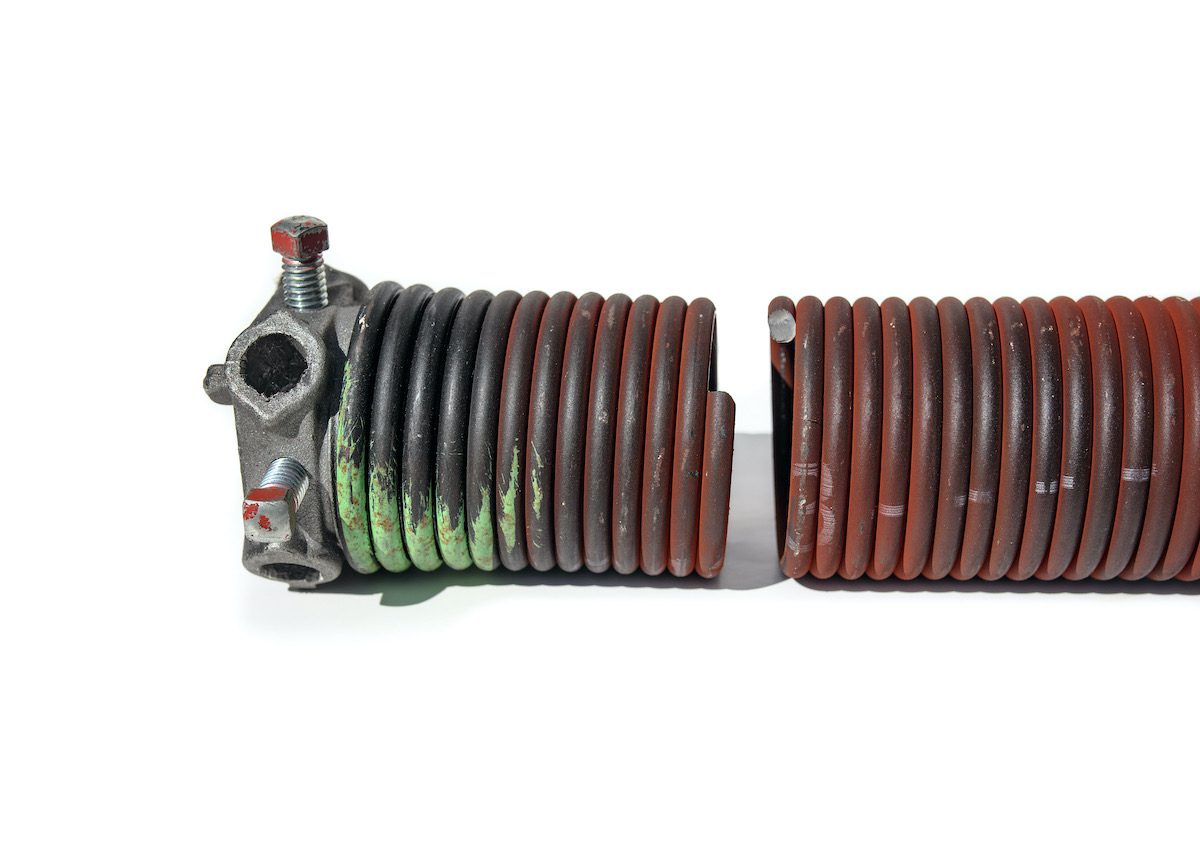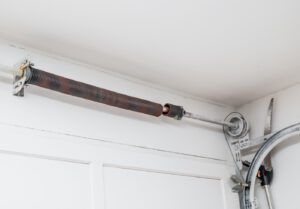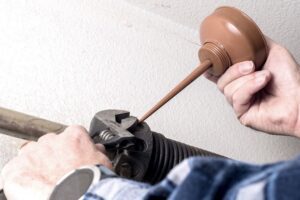
When it comes to home maintenance, there’s one essential element that often goes unnoticed—the garage door springs. These seemingly unassuming components play a critical role in your daily life, allowing you easy access to your garage while keeping your home secure. However, many homeowners underestimate their significance, especially when it comes to their response to external factors like weather conditions. In this blog post, we’ll delve into the world of garage door springs and explore how carbon, a key element, can impact their performance during the cold winter months.
Continue reading along to discover carbon’s impact on garage door springs in winter.
Understanding the Purpose of Garage Door Springs
Before we dive into the specifics of carbon’s impact, let’s understand why garage door springs are so crucial. Imagine your garage door as a massive slab of material, whether it’s wood, steel, or another durable substance. Lifting such a heavy door manually would be an arduous task, and that’s where garage door springs come into play.
Garage door springs are responsible for managing the weight of the door. When you activate your garage door opener, these springs release tension, allowing the door to lift smoothly. Once the door is open, the springs store energy, which is then used to close the door in a controlled manner. This constant cycle of stretching and releasing the springs maintains a state of continuous strain.
Despite their robust appearance, garage door springs are among the first components to wear out. This wear and tear occur primarily due to the constant stress and tension they experience during the door’s operation. Every time you open or close your garage door, the springs undergo significant strain. Over time, this accumulated stress can lead to a condition known as ‘metal fatigue’ in the springs, resulting in their gradual weakening and, potentially, failure.

Garage Door Spring Safety Disclaimer
The information provided in this blog post is for informational purposes only and should not be considered a substitute for professional garage door maintenance, repair, or installation services. Garage door springs are under extreme tension and can cause severe injury or death if handled improperly. The impact of cold weather on high-carbon steel springs increases the risk of sudden breakage, making professional assessment and repair crucial. Overhead Door Company of Huntsville/North Alabama™ strongly advises against DIY repairs or adjustments to garage door springs. For your safety, always consult a trained and experienced professional.
Carbon’s Role in Winter Garage Door Spring Breakage
Now that we have a clear understanding of the role garage door springs play, let’s explore the role of carbon, a fundamental element found in these springs, in their susceptibility to breaking during the cold winter months.
Garage door springs are typically crafted from high-carbon steel, a material chosen for its strength and durability. However, the same carbon that enhances these properties can also make the springs more prone to cold-induced brittleness.
One crucial point to note is that high-carbon steel springs become harder and stronger as temperatures drop. This might initially seem advantageous—after all, who wouldn’t want stronger springs? However, this increased hardness comes at a cost: reduced toughness. In simple terms, while the springs may become harder, they also become less resistant to cracking or fracturing. This phenomenon is particularly pronounced in extremely low temperatures, such as those experienced during harsh winter weather.
The combination of high carbon content and cold weather can intensify the ‘metal fatigue’ experienced by garage door springs. The constant stress and tension these springs undergo during operation, combined with cold-induced brittleness, create a precarious situation. This increased vulnerability during winter can ultimately lead to spring breakage, which often necessitates professional garage door services.
Understanding Carbon’s Impact on Garage Door Springs
So, what does all this mean for homeowners? It underscores the need to strike a delicate balance between strength and vulnerability, particularly due to the carbon content in high-carbon steel springs. This awareness sheds light on the nuanced challenges these springs face during the winter season and underscores the importance of proactive measures to protect them from cold-induced stress and potential breakage.

Methods to Prevent Cold Weather Damage to Garage Door Springs
While you cannot entirely eliminate the impact of stress and cold weather on garage door springs, you can take specific measures to mitigate their effects over time. Here are some practical steps you can take:
Method 1: Keep the Garage Warm
A well-insulated garage can help maintain a higher temperature, which benefits the springs. Proper insulation, combined with minimizing the time your garage door remains open during winter, can help trap heat inside. Make it a habit to promptly close the door after use to ensure your garage retains as much warmth as possible.
Method 2: Lubrication
Proper lubrication is another crucial preventative measure that applies to both torsion and extension springs. Using a high-quality lubricant that can absorb into the spring helps prevent it from becoming brittle in cold temperatures. Additionally, garage environments can become damp during winter, leading to spring rust. Regular lubrication serves as a defense against rust formation.
Experts often recommend using white lithium or silicone spray on your garage door springs for optimal lubrication. It’s important to avoid using common products like WD-40, as they can remove lubricant and potentially damage your springs, leading to premature failure.
Method 3: Relieve Stress on the Springs
Reducing stress on garage door springs is just as vital as keeping them warm. Allowing the springs to relax is crucial, but this can be challenging during winter. However, the opportunity to keep the door open for extended periods sometimes arises, especially during colder weather. If you encounter unseasonably warm days, consider leaving the garage door open for a few hours to relieve some of the tension. Of course, ensure that this practice doesn’t compromise your home’s security.

Knowing When to Call for Garage Door Services
A word of caution!
While following these preventative measures can certainly extend the life of your garage door springs, it’s essential to acknowledge that they will eventually succumb to wear and tear, compounded by the impact of cold weather. When the springs reach a point of potential failure, it’s crucial to seek professional assistance. Attempting to replace or repair garage door springs on your own can be hazardous and should be avoided.
It is important to emphasize that garage door spring replacement or repair should only be performed by a certified garage door technician. Attempting to replace a torsion spring or extension spring without the necessary expertise, tools, and experience can pose serious risks due to the high tension involved in these spring systems. For your safety, it is strongly recommended to entrust this task to a qualified professional.
For More on Why Garage Door Springs Might Break, Symptoms and What to Do!
In summary
Garage door springs exhibit resilience but are susceptible to wear and tear, particularly in colder weather conditions, due to the intricate relationship between the carbon content in the steel and the durability of these springs. By implementing these strategies, you can minimize the damage caused by frigid weather. Remember, if a garage door spring breaks, always leave the repair to professionals for your safety and peace of mind.
For More on Maintaining Garage Door Springs
Schedule your garage door maintenance or repair with Overhead Door Company of Huntsville/North Alabama™ today at 256-772-3674, your trusted local partner since 1968, serving residential and commercial customers throughout North Alabama. Protect your investment and ensure the continued functionality of your garage door system. Don’t wait until it’s too late—take proactive steps to safeguard your home today.
Visit our Troubleshooting Guide
Disclaimer: The information contained herein is not meant to be comprehensive and is for informational purposes only. You should not undertake to perform anything described herein without adequate training and/or supervision. Overhead Door Company of Huntsville/North Alabama™ disclaims any responsibility for any injury, damage, or loss as a result of reliance upon the information found on this site/blog.
This blog post is intended to provide general knowledge regarding the effects of cold weather on garage door springs and preventive maintenance strategies. It is not a step-by-step repair guide. Garage door systems contain high-tension components that require professional handling. Overhead Door Company of Huntsville/North Alabama™ disclaims any liability for injuries, damages, or losses resulting from reliance on the information provided. If you suspect a broken or failing garage door spring, contact a qualified professional for a thorough inspection and safe repair services.






